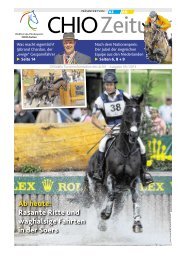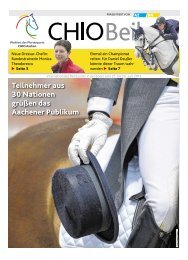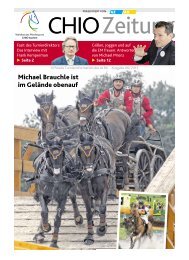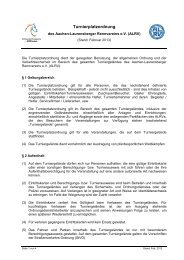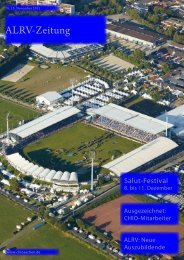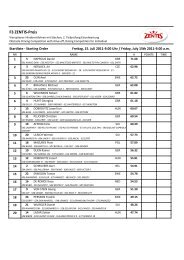Media Guide CHIO Aachen 2013
Media Guide CHIO Aachen 2013
Media Guide CHIO Aachen 2013
Sie wollen auch ein ePaper? Erhöhen Sie die Reichweite Ihrer Titel.
YUMPU macht aus Druck-PDFs automatisch weboptimierte ePaper, die Google liebt.
German Judges Association (Deutsche Richtervereinigung e. V.) plus seven affiliated associations:<br />
Westernreiter Union Deutschland e. V., Island Pferde-, Reiter- und Züchterverband e. V.,<br />
Verein Deutscher Distanzreiter und -fahrer e. V., Deutsches Kuratorium für Therapeutisches Reiten<br />
e. V., Deutscher Akademischer Reiterverband e. V., Internationale Gangpferde-Vereinigung<br />
e. V. and the Bundesverband für klassisch-barocke Reiterei Deutschland.<br />
Competition Sport<br />
•<br />
man breed. In this discipline, 25 out of the 124 competing horses were German. 19 out of the<br />
47 vaulting horses were of German breed, they won six of nine possible medals. Also in the discipline<br />
para-dressage there were lots of successful products from German breed competing: 23<br />
out of altogether 88 horses won 16 out of 42 possible medals. In the six warm blood disciplines<br />
jumping, dressage, eventing, driving, vaulting and para-dressage, horses of German breed won<br />
52 of 159 possible medals.<br />
German horse breeding is thus continually the most successful of the world by far.<br />
In 2012<br />
The Horse as Economical Factor<br />
Archiv / Archive<br />
• 3,609 (2011: 3,594) equestrian events with 68,901 competitions (2011: 67,750) and 1,475,922<br />
starts (2011: 1,459,829) were run. 31,129,772 Euros of prize money (2011: 30,984,265 Euros)<br />
were paid.<br />
• the FN issued 80,425 riding permits (2011: 81,471), that is licenses for participation at horse<br />
shows, and 1.346 licenses for foreign riders who took part in German tournaments (2011:<br />
1.308).<br />
• the FN issued license documents for 137,043 competition horses (2011: 138,326) and 2,223 FEI<br />
passports for horses competing internationally (2011: 2,216). Furthermore, 25,643 new competition<br />
horses were enlisted in the official tournament horse register (2011: 25,136 ). Furthermore,<br />
passports for 8,743 leisure horses were issued (2011: 10,157).<br />
Achievements in Equestrian Sport<br />
• At Olympic Games (1912 to 2008) German dressage, jumping and eventing riders won 85 medals,<br />
thereof 39 gold, 21 silver and 25 bronze medals.<br />
• At World Championships in the eight official equestrian disciplines (jumping, dressage, eventing,<br />
driving, endurance, vaulting, reining and para-dressage, riding as sport for disabled people),<br />
German competitors won altogether 205 medals, thereof 85 gold, 60 silver and 60 bronze<br />
medals.<br />
• At European Championships in the eight official equestrian disciplines (including youngster<br />
competitions), German competitors won altogether 942 medals, thereof 401 gold, 299 silver<br />
and 242 bronze medals.<br />
• According to these figures, Germany is the world’s most successful horse sport nation, and<br />
equestrian sport is likely to be the most successful sport in Germany.<br />
German Horse Breeding<br />
The German horse breeding is an important factor for the German equestrian success:<br />
• In 2012, 3,642 riding horse breeding stallions (2011: 3,642) and 59,886 riding horse breeding<br />
mares (2011: 64,824) with 27,503 riding horse foals (2011: 29,532) were recorded in Germany. In<br />
addition to that, 3,850 pony and small horse stallions (2011: 4,128) as well as 22,708 pony and<br />
small horse brood mares (2011: 24,303) and 9,152 foals (2011: 9,647) were registered.<br />
• At the World Equestrian Games 2010 in Lexington/Kentucky, 143 out of the 696 competing<br />
horses were proven German bred horses. These horses won 53 of 185 possible medals, among<br />
that 21 gold, 16 silver and 16 bronze medals. Among the 65 dressage horses in Kentucky, 22<br />
were of German breed, they won seven of 18 possible medals. In the jumping competitions, 38<br />
out of the 120 horses were of German breed. Out of the 15 possible medals, three (gold) were<br />
won by German-bred horses. In eventing, one gold medal was achieved by a horse of German<br />
breed. With 18 out of 59 possible medals, most medals were won by the driving horses of Ger-<br />
• According to a scientific survey every 3rd to 4th horse creates one job. Hence, more than<br />
300,000 jobs are provided by sport and hobby as well as the breeding and keeping of horses<br />
in Germany. Between 7,000 and 10,000 people earn their living by giving riding lessons and<br />
education of riders and horses.<br />
• About 10,000 German companies, craft and service businesses deal mainly with horse-related<br />
products and services.<br />
• About 1 million horses and ponies in Germany consume more than 1.6 million metric tons of<br />
grain and approximately 1.8 million metric tons of hay and straw per year.<br />
• Riders and horse owners spend approx. 2.6 billion Euros per year for recurring costs around<br />
the horse. It is extremely difficult to estimate the entire turnover of equestrian sport, however,<br />
careful estimations put the sum at well over 5 billion Euro.<br />
• At the horse auctions of the breeding societies in 2012, a total of 931 riding horses were sold at<br />
an average price of more than 20,769 Euro. The total turnover at these auctions was 19,335,939<br />
Euro (2011: 1,048 riding horses, average price 21,348 Euros, total turnover 22,373,999 Euros).<br />
Furthermore, 1,819 breeding horses and foals, cold breeds and ponies were sold at the auctions<br />
of the breeding societies for a total of 15,868,984 Euros. Altogether, 2,750 horses and ponies<br />
were sold in the course of the associations’ auctions for a total prize of 35,204,923 Euros.<br />
• Reading educates: That is why there are currently more than 5,000 specialized book titles covering<br />
equestrian topics being sold in Germany. In addition, there are approximately 60 periodical<br />
equestrian reviews and magazines that offer information and entertainment around the<br />
horse to the reader on the German-speaking market. There is no other sport in Germany that<br />
has an equal recognition with regard to books and magazines.<br />
• In 2012, there were more than 236 hours of equestrian sport coverage on German TV (2011:<br />
289). For the TV rights treaty concluded with the agency SportA (rights agency of the German<br />
public TV stations), more than 90 (2011: 99) were relevant. 88 organisers of horse shows profited<br />
from the TV rights treaty with the SportA. Of those 21 had more than one hour of broadcast<br />
time, nine had more than three hours and two organisers had more than five hours of broadcast<br />
time. One organizer (<strong>CHIO</strong> <strong>Aachen</strong>) even had a broadcast time of more than ten hours. Front<br />
runner regarding equestrian broadcasts (both counting and not counting towards the SportA<br />
treaty) was Eurosport with 71 hours, second was the Norddeutscher Rundfunk (NDR) with 42<br />
hours. The Westdeutscher Rundfunk (WDR) was third with 35 hours, the Sport1 was fourth with<br />
25 hours. ARD and ZDF broadcasted more than 20 hours of equestrian sport.<br />
• The importance of the internet is steadily increasing, also in equestrian sport. In 2011, the FN’s<br />
internet presence (www.pferd-aktuell.de) had exactly 2,917,717 visitors with 10,652,455 page<br />
views.<br />
Archiv / Archive<br />
82<br />
83



